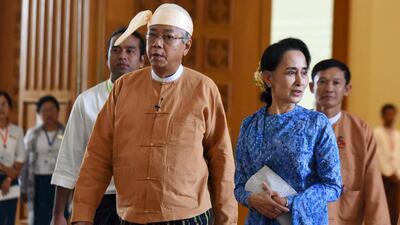NAYPYIDAW // Myanmar entered a new era on Wednesday as Aung San Suu Kyi’s democracy movement took power after 50 years of military domination, with a close aide of the Nobel laureate sworn in as president.
Htin Kyaw, a school friend and confidante of the democracy campaigner, succeeded former general Thein Sein, who ushered in reforms that transformed Myanmar.
As Mr Htin Kyaw, 69, took the oath of office, he hinted he would change the army-imposed constitution that has excluded his friend and mentor from the top post.
Ms Suu Kyi, 70, is barred from the presidency by the junta-scripted constitution but has said she will steer the government anyway.
Mr Htin Kyaw is expected to act as her proxy.
The handover marked the final act of a prolonged transition since Ms Suu Kyi’s National League for Democracy party swept elections last November.
The NLD won 80 per cent of parliamentary seats. They are tasked with reviving a battered economy and a society straitjacketed by the army, which ruled between 1962 and 2011 when reforms first began under Mr Thein Sein’s quasi-civilian administration.
The new president pledged to be “faithful to the people of the republic of the union of Myanmar”.
“I will uphold and abide by the constitution and its laws. I will carry out my responsibilities uprightly and to the best of my ability,” he said.
In a later ceremony at the presidential palace, Mr Thein Sein symbolically handed over to his successor as Ms Suu Kyi looked on.
The military retains a quarter of all parliamentary seats and three key posts in the cabinet.
Ms Suu Kyi joined that cabinet holding a clutch of positions including foreign minister.
In a speech later in the day, Mr Htin Kyaw signalled that the NLD would continue its long-stated vow to amend the constitution to bring it up to “democratic standards”.
Mr Htin Kyaw gave no details on how the party would go about this.
Expectations ran high among Myanmar’s 51 million people but the new government faced a steep task.
Revolts rage in ethnic minority borderlands, poverty is widespread and the military holds huge political and economic power.
Sectarian tensions and anti-Muslim sentiment have flared in recent years.
The European Union welcomed Mr Htin Kyaw’s accession as a “new important step in the consolidation of the country’s remarkable transition”.
But it added: “Many challenges remain for Myanmar to become an inclusive, pluralistic and peaceful democracy.”
NLD lawmakers also have little practical experience of government.
Some were jailed by the junta, including most famously Ms Suu Kyi who was held under house arrest for a total of 15 years.
But on a historic day the party faithful were undaunted by the challenges ahead.
“I’m really happy. I am also remembering my colleagues who sacrificed for this battle [for democracy],” said NLD lawmaker Aye Naing.
Among a smattering of NLD supporters outside parliament, Yin Myint May welcomed the handover. “It is the biggest day for us,” she said.
“Remember we started [the democracy fight] in 1990,” she added, referring to elections won in a landslide by the NLD that were ignored by the junta.
Myanmar has witnessed a staggering political change since 2011 under Mr Thein Sein.
Investors and tourists began to return as repression eased, promising a better future to a public who now have access to mobile phones, cheaper cars and other consumer goods.
Hundreds of political prisoners were released and media censorship eased. Most western sanctions have been rolled back.
But Ms Suu Kyi’s administration must still maintain smooth relations with the military that locked her and many of her colleagues up for years.
As well as their guaranteed parliamentary bloc, the junta charter gave the army chief control over the home affairs, border and defence ministries – and with it sweeping powers over the civil service.
The NLD has also hit stumbling blocks even before taking office.
There are concerns over the cabinet line-up in which Ms Suu Kyi is the only woman and the majority of members are in their 60s or older, despite representing one the region’s youngest populations.
* Agence France-Presse

